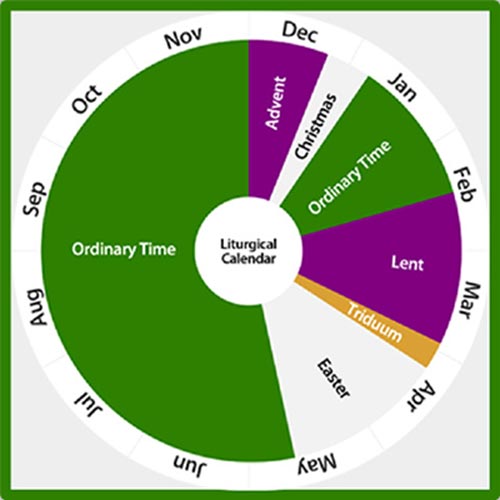
Recently, I posted on my understanding that the word “Ordinary” in “Ordinary Time” refers to ordinal numbers: 1st, 2nd, 3rd, and so forth (rather than, say, “everyday/humdrum…”)
I was most delighted by Matt Chinery offering a completely different interpretation (one I had never come across) by Michael Foley: “The Origins and Meaning of Ordinary Time“. In summary, Michael Foley contends that “Ordinary” in “Ordinary Time” is being used in the same way as we use that word in “Ordinary of the Eucharist” and “Ordinary of the Daily Office”.
To revise: the Ordinary of the Eucharist is that part of the Eucharist that doesn’t change (Greeting; confession; responses; Holy Holy…; Lord’s Prayer; Lamb of God…). The Ordinary of the Eucharist contrasts with the “Proper” – the changing scriptural texts, the Introit, collect or Opening Prayer, Gradual, Alleluia or Tract, Sequence, Offertory, and Communion verse… The Ordinary of the Daily Office is that part of the Daily Office that doesn’t change (Greeting; responses; Benedictus; Magnificat;…). The Ordinary of the Daily Office contrasts with the changing Proper – the feast day, reading, etc.
Michael Foley contends that “Ordinary Time” refers to the Ordinary of the Season:
The author concludes that the most likely explanation is the one that has not been given before, namely, that “Ordinary Time” refers to an Ordinary of Seasons
The Origins and Meaning of Ordinary Time ABSTRACT
I dispute Michael Foley’s contention.
1) This use of “Ordinary” as found in “Ordinary of the Eucharist” and “Ordinary of the Daily Office” refers to elements that do not change whenever the Eucharist or Daily Office is celebrated. There is nothing in Ordinary Time that forms the unchanging foundation of the Seasons of the Year (Advent, Christmas, Lent, Easter). The sentence, ‘“Ordinary Time” refers to an Ordinary of Seasons’, sounds promising – but is meaningless.
2) Language simply does not work in the manner that Michael Foley presents. A word in regular usage cannot mean, in that regular usage, an interpretation that “has not been given before”. A word means what the user intends it to mean and what hearers and readers understand it to mean. Some words are ambiguous – especially homonyms (words that sound the same) and homographs (words that are spelt the same). We can have a discussion about the meaning of a word – the majority usage may even be incorrect. But here Michael Foley is saying that no one’s, not a single person’s understanding of “Ordinary” in the regular use of “Ordinary Time” has been correct, and he is now the first person to give the correct meaning of the word “Ordinary”.
“When I use a word,” Humpty Dumpty said, in rather a scornful tone, “it means just what I choose it to mean—neither more nor less.” “The question is,” said Alice, “whether you can make words mean so many different things.” “The question is,” said Humpty Dumpty, “which is to be master—that’s all.”
LEWIS CARROLL (Charles L. Dodgson), Through the Looking-Glass, chapter 6
An interesting point made in Michael Foley’s article – it is obvious once stated, but I’ve never seen it stated before: at various times right throughout the Church Year, the colours red, white, and purple are used (martyr; confessor, baptism, wedding, funeral; confession, funeral), but Green is never used from Advent Sunday to the Baptism of the Lord, nor from Ash Wednesday to the Day of Pentecost. Green is only used in Ordinary Time – from The Baptism of the Lord to Ash Wednesday and from the Day of Pentecost to Advent Sunday.


